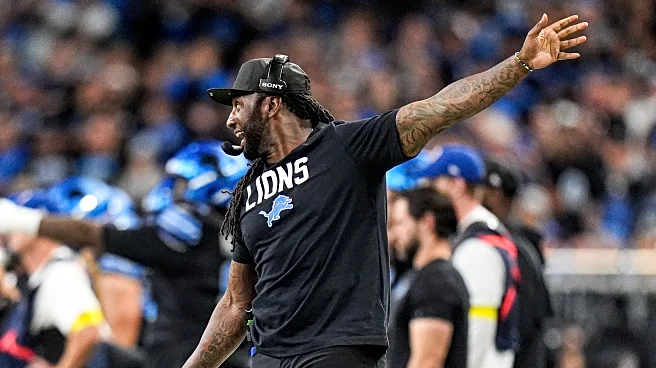Through 15 weeks of the NFL season last year, the Detroit Lions had 21 players on injured reserve. Some of the most important pieces to their defense, including Aidan Hutchinson, Alim McNeill, and Derrick Barnes, were put on the shelf before the team eventually won 15 games and earned the top seed in the NFC. They also weren’t on the field when the Lions lost in the Divisional Round to the Washington Commanders, a nightmarish end to a surreal season.
But for the first time in over a year, those three
players were all back on the field, making all the difference for the Lions in their 24-9 win over the Tampa Bay Buccaneers.
Hutchinson was his usual disruptive self, logging seven quarterback pressures according to NFL Pro, including a QB hit and a pass defended. McNeill’s return supplied a reminder that he’s a force in the middle of Detroit’s defense, walking guards into the backfield en route to a couple of pressures and a pass defended on third down to get the Lions’ defense off the field at the start of the second quarter—Detroit held Tampa Bay to measly 25% conversion rate on third down (4-of-16). And Barnes, recipient of a game ball from Dan Campbell, recorded five tackles, a sack, a tackle for loss, and three defensive stops against the Buccaneers per NFL Pro data.
For all the early-season talk of Baker Mayfield as the league’s MVP, he ran into a Lions defense that didn’t allow the Buccaneers to cross midfield until the waning moments of the first half. Detroit held Tampa Bay to just 3.8 yards per play on Monday night, and Mayfield himself posted season lows in passer rating (66.1) and yards per attempt (4.6). The media’s darling for MVP looked rattled and inaccurate all night long, but it wasn’t just the returning stars who set the tone for Detroit’s defense. The depth defenders—the “nameless faces” Kelvin Sheppard referred to in the locker room after the game—delivered when injuries and suspension depleted Detroit’s secondary.
The Lions were without both of their starting outside cornerbacks and safeties, but not unlike the players from last year’s defense, the “Legion of Whom” stepped up and made plays when the team needed this one performance to get them to the bye week.
Erick Hallett filled in all over the secondary, playing at safety, nickel, and outside corner. He finished as the team’s co-leader in tackles (8) and recorded a team-high four stops per NFL Pro. Arthur Maulet, on his sixth NFL team in nine seasons, came away with an incredible interception. Nick Whiteside, the former GLIAC Defensive Back of the Year with Saginaw Valley State, broke up three passes when covering Emeka Egbuka—one of the early frontrunners for Offensive Rookie of the Year this season—in addition to the pass breakup he notched on a two-point attempt that kept the game 14-9 in the third quarter. Rock Ya-Sin, another veteran depth defender in Detroit’s secondary, thrust into a starting role, had four tackles and two passes defended against Mike Evans.
Complementary football has come to define Campbell’s Lions over the past couple of seasons. An offense chock full of talent has often been the source of hope and optimism, but on a night where the offense lacked consistency, rhythm, and execution, the defense answered the call. When Aaron Glenn left Detroit for a head coaching position with the New York Jets, there was reason to wonder how a first-year defensive coordinator like Sheppard could handle adversity when it hit. Well, that adversity hit the secondary like a truck—the Branch suspension felt like that truck had gone in reverse and backed over the already depleted group. But the defense—their coordinator, the foundational pieces, the emergency reserves—helped get Detroit to the bye with a 5-2 record, still with plenty of areas to improve, positional groups to get healthy, and an offense to gel.

















